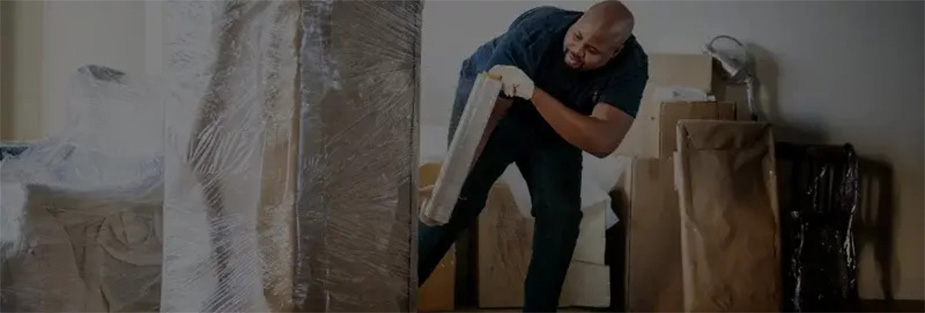
Reduce transit insurance claims: prevent damages during transit
Moving is a stressful experience, and one of the biggest concerns is the safety of your belongings during transit. Unfortunately, even with the best of intentions, accidents can happen, and items can become damaged during transport. Transit insurance can provide some financial relief, but it’s better to prevent damages in the first place. In this blog, we will discuss strategies for preventing damages during transit and reducing transit insurance claims.
Proper Packing:
Proper packing is one of the most important steps in preventing damages during transit. It’s important to choose the right packing materials and pack items in a way that minimizes the risk of damage. Here are some tips for proper packing:
Choose the right packing materials: The right packing materials can make all the difference in preventing damages during transit. Invest in high-quality materials, such as sturdy boxes, bubble wrap, packing peanuts, and packing tape. For fragile items, consider using specialized packing materials, such as foam padding, packing paper, or custom-made crates.
Pack items tightly: When packing items, it’s important to pack them tightly to prevent shifting during transit. Use packing materials to fill any empty space in the box or container to keep items from moving around. This can also help prevent items from rubbing against each other and causing damage.
Label and organize packed items: Proper labelling and organization can help ensure that items are packed in the right way and are easy to find during unpacking. Label boxes with their contents and destination, and use a numbering system to keep track of all packed items. This can also help transport companies load and unload items more efficiently, reducing the risk of damage.
Pack items based on weight and fragility: When packing items, it’s important to pack heavier items at the bottom of the box or container and lighter, more fragile items on top. This can help prevent damage caused by crushing or pressure on fragile items.
Use proper techniques for different types of items: Different types of items require different packing techniques. For example, for electronics, it’s important to pack them in their original packaging or a specially designed box with foam padding. For artwork or other valuable items, consider using custom-made crates and hiring a professional packing service.
By following these tips for proper packing, you can significantly reduce the risk of damages during transit and ensure that your goods arrive at their destination safely and intact.
Secure Loading:
Secure loading is another important step in preventing damages during transit. It involves properly loading and securing items into a transport vehicle to prevent shifting, rubbing, and other types of damage. Here are some tips for secure loading:
Choose the right transport vehicle: The right transport vehicle can make all the difference in preventing damages during transit. Consider the size and weight of your items and choose a vehicle that can accommodate them safely and securely. If you’re unsure, consult with your transport company for advice.
Load items in the right order: When loading items, it’s important to load them in the right order to prevent damage. Pack heavier items at the bottom of the vehicle and lighter, more fragile items on top. This can help prevent crushing or pressure on fragile items.
Use proper techniques for different types of items: Different types of items require different loading techniques. For example, for large, heavy items, use lifting equipment to prevent injuries and damage. For delicate items, use specialized loading equipment, such as pallet jacks or dollies.
Use tie-downs and straps: Tie-downs and straps can help secure items during transit and prevent them from shifting or falling over. Use high-quality tie-downs and straps that are designed for the weight and size of your items, and secure them tightly to prevent movement.
Use protective materials: Consider using protective materials, such as blankets or padding, to prevent rubbing and scratching during transit. This can help prevent damage to delicate or valuable items.
By following these tips for secure loading, you can significantly reduce the risk of damages during transit and ensure that your goods arrive at their destination safely and intact. It’s important to take the time to properly load and secure items to prevent damage and reduce transit insurance claims.
Top of Form
Careful Transport:
Careful transport is another important step in preventing damages during transit. It involves choosing the right transport company and ensuring that items are loaded and transported in a safe and secure manner. Here are some tips for careful transport:
Choose the right transport company: Choosing the right transport company can make all the difference in preventing damages during transit. Look for a company with a good reputation for safe and secure transport, and ask for references from previous customers. Also, make sure the company is properly licensed and insured.
Consider the route: When choosing a transport company, consider the route that will be taken. Avoid routes that are known to have hazardous or challenging conditions, such as rough roads or extreme weather. If a hazardous route is unavoidable, make sure the transport company is experienced in navigating such conditions.
Monitor the transport: Once items are loaded into the transport vehicle, monitor the transport to ensure that items are being transported safely and securely. This may involve using tracking systems or communicating with the transport company to get updates on the progress of the transport.
Ensure items are properly secured during transport: During transport, it’s important to ensure that items are properly secured to prevent shifting and movement. Make sure that tie-downs and straps are tightened properly and regularly checked during transport to prevent damage.
Take precautions during loading and unloading: Loading and unloading are critical times during transport and should be done with care. Use appropriate equipment and techniques for different types of items, and make sure that items are properly secured during loading and unloading.
By following these tips for careful transport, you can significantly reduce the risk of damages during transit and ensure that your goods arrive at their destination safely and intact. It’s important to take the time to properly choose a transport company and ensure that items are loaded and transported in a safe and secure manner to prevent damage and reduce transit insurance claims.
Safe Unloading:
Safe unloading is the final step in the transit process and is just as important as the other steps in preventing damages. Here are some tips for safe unloading:
Plan ahead: Before unloading, plan the process carefully to ensure that items are unloaded in a safe and efficient manner. This may involve choosing the right unloading equipment, ensuring that the unloading area is free from obstacles, and making sure that there is enough space to manoeuvre items.
Use the right equipment: Depending on the type of items being unloaded, different types of equipment may be necessary. For example, heavy items may require cranes or forklifts, while fragile items may require special handling equipment. Make sure that the equipment being used is appropriate for the items being unloaded and that it is in good working condition.
Unload items carefully: During unloading, it’s important to handle items carefully to prevent damage. Use appropriate techniques for different types of items, such as using padding or blankets for fragile items, and avoiding dragging or dropping heavy items.
Inspect items for damages: After unloading, inspect items carefully for any damages that may have occurred during transit. This may involve checking for scratches, dents, or other signs of damage. Document any damages that are found, and take photos if necessary.
Ensure proper storage: Once items have been unloaded, make sure that they are stored properly to prevent further damage. This may involve using appropriate storage methods, such as storing fragile items separately from heavy items, or using temperature-controlled storage for sensitive items.
By following these tips for safe unloading, you can prevent damages during this critical step of the transit process. Taking the time to carefully plan and execute the unloading process can help to ensure that items arrive at their destination safely and without any damages, which can ultimately reduce transit insurance claims.
Transit Insurance:
Transit insurance can provide financial relief in the event of damages during transit. However, it’s important to understand what is and is not covered by transit insurance. For example, some transit insurance policies may not cover damages caused by natural disasters, while others may not cover damages caused by improper packing or loading techniques.
If you need to file a transit insurance claim, it’s important to do so properly to ensure the best chance of a successful claim. Keep accurate records, document damages, and file the claim promptly. It’s also important to follow up on the claim to ensure it is being processed in a timely manner.
When choosing a transit insurance policy, it’s important to read the fine print and understand the terms and conditions of the policy. Some policies may have exclusions or limitations on coverage that may not be immediately obvious. It’s also important to compare policies from different providers to find the best coverage at the most affordable price.
If you are unsure about what is and is not covered by transit insurance, consult with an insurance agent or broker who specializes in transit insurance. They can help you find the best policy for your needs and ensure you have the proper coverage in place to protect your goods during transit.
In the event of damages during transit, it’s important to take action immediately. Document the damages thoroughly, including taking pictures and video if possible. Notify the transport company and your insurance provider as soon as possible to ensure the best chance of a successful claim.
Conclusion
Preventing damages during transit and reducing transit insurance claims requires careful planning, attention to detail, and adherence to best practices. By taking the time to properly pack, load, transport, and unload your items, you can significantly reduce the risk of damages and ensure your goods arrive at their destination safely and intact.
Investing in high-quality packing materials, properly securing items during transport, and choosing a reputable transport company are all important steps in preventing damages during transit. Additionally, understanding transit insurance and properly documenting damages can help provide financial relief in the event of an incident.
By implementing these strategies, you can reduce transit insurance claims and enjoy peace of mind knowing that your goods are protected during transit. Take the time to properly prepare for your next transit and ensure your items arrive safely at their destination.
ISS Relocation is a relocation company that specializes in providing hassle-free relocation services for individuals and businesses moving abroad. As a professional relocation company, ISS Relocation understands the importance of preventing damages during transit and reducing transit insurance claims. They work hard to ensure that all items are properly packed, loaded, transported, and unloaded to prevent damages.
ISS Relocation takes great care in using proper packing materials and techniques to ensure that items are protected during transit. They use high-quality materials such as bubble wrap, packing paper, and sturdy boxes to prevent damages from impacts or vibrations during transit. Additionally, they label and organize items to ensure that they are properly handled during loading and unloading.
During loading, ISS Relocation ensures that items are properly secured to prevent them from shifting or moving during transit. They use tie-downs and straps to secure items, and they take care to choose the right transport company to ensure that items are transported safely.
Once items arrive at their destination, ISS Relocation carefully unloads them and checks for damages. They take care to handle items carefully to prevent further damages during unloading, and they inspect items thoroughly to identify any damages that may have occurred during transit. Overall, ISS Relocation is dedicated to providing top-quality relocation services and ensuring that items are transported safely and without damages. Their attention to detail and commitment to best practices in packing, loading, transporting, and unloading can help to reduce transit insurance claims and ensure that clients are completely satisfied with their relocation experience.
Plan Stress-free Move with Top Moving Company in UAE - ISS Relocations

Frequently Asked Questions
What is the process of transit insurance claim in Dubai?
The process of filing a transit insurance claim in Dubai involves reporting damage or loss to the insurance provider, providing documentation such as shipping receipts, photos of damaged items, and an inventory list. ISS Relocations assists with the entire claims process, ensuring your claim is filed correctly and your goods are protected during transit.
What is transit in insurance for UAE?
Transit in insurance for the UAE refers to coverage for goods being transported from one place to another, protecting them from risks such as damage, theft, or loss during the shipping process. ISS Relocations offers comprehensive transit insurance services, ensuring that your belongings are covered throughout the move.
What does goods in transit insurance cover in UAE?
Goods in transit insurance in the UAE covers loss, theft, and damage of goods while they are being transported, whether by land, sea, or air. ISS Relocations provides reliable goods in transit insurance, ensuring that your belongings are fully protected during their journey to and from the UAE.
What is a shipping insurance claim?
A shipping insurance claim is a formal request made to the insurer to reimburse or repair damages or losses that occurred during the shipping process. ISS Relocations helps you understand the shipping insurance claim process, offering assistance in filing claims to ensure your belongings are properly compensated.
Why do I need transit insurance in Dubai?
Transit insurance in Dubai is essential to protect your goods from unforeseen risks during transport, such as damage, theft, or accidents. ISS Relocations provides tailored transit insurance coverage to give you peace of mind, knowing your belongings are safe while being transported to or from the UAE.
What is the purpose of an insurance claim in Dubai?
The purpose of an insurance claim in Dubai is to recover financial losses or repair damages caused during the transportation of goods. ISS Relocations assists in filing accurate insurance claims, ensuring that your belongings are covered and that you receive the compensation you’re entitled to in case of damage or loss.
Why is goods in transit insurance important?
Goods in transit insurance is important because it safeguards your belongings against potential risks, such as theft, accidents, or natural disasters during transportation. ISS Relocations offers reliable goods in transit insurance, ensuring that your valuable possessions are protected and covered throughout the moving process.
Moving Company - Recent Blog
Stay informed and prepared for your next move with our latest blogs on moving services in the UAE. From expert packing tips to international relocation guides, ISS Relocations brings you up-to-date insights to make your moving experience smoother, safer, and stress-free.










